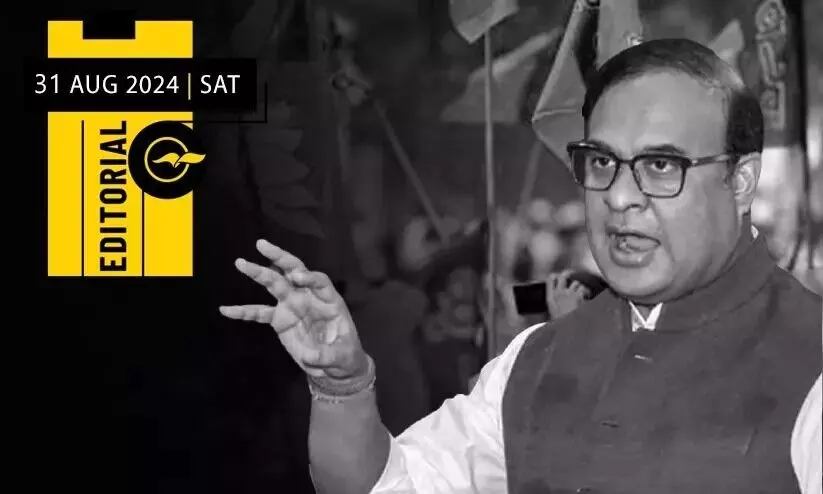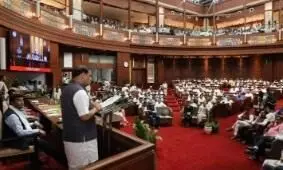
Assam: the new laboratory of Hindutva
text_fieldsThe recent passage of a special bill in the Assam Assembly regarding Muslim marriage and divorce has reignited the debate on the Uniform Civil Code. The Narendra Modi government, which has successfully implemented various Hindutva agendas, had earlier announced its intention to implement the Uniform Civil Code in its third term. The Sangh Parivar, which had contested the elections expecting a two-thirds majority in Parliament, was forced to limit its agenda to a minimum common program due to the circumstances that necessitated the support of other parties to retain power. Even so, Modi and his allies have reiterated their commitment to implementing the Uniform Civil Code. Concurrently, BJP-ruled states have been making efforts to introduce smaller versions of the Uniform Civil Code. The new law in Assam is part of this agenda. The Assam Compulsory Registration of Muslim Marriages and Divorces Bill, passed by the government despite objections by the Opposition, mandates registration with the government of all Muslim marriages and divorces in the state. Chief Minister Himanta Biswa Sarma stated in the assembly that the law aims to prevent child marriage, ensure the consent of both parties in marriage, etc. He explained that this is a strict measure to curb the rising trend of child marriage, given that over 4,000 cases of child marriage were registered in the state last year alone. While this may sound progressive, the underlying dangers are not insignificant.
The government has introduced the new bill, repealing the 1935 Assam Muslim Marriage and Divorce Registration Act. Even under the old law, Muslims in the state were required to register their marriages and divorces, albeit through designated Qadis. When the law came into force in 1935, registration was not mandatory. In 2008, the law was amended. Thus, even though the old law could still be amended to fix the marriage age, clarify maintenance for divorcees, and so on, it has been completely discarded, and a new law based on the 'Special Marriage Act' is being introduced. The purpose is clear: to nullify the authority of Qadis and community leadership, who were responsible for the practical and convenient implementation of Muslim personal law. When this is coupled with Himanta's statement in his concluding speech that the next goal is to end polygamy among Muslims, the picture becomes clear. In addition, the law that allowed members of the legislative assembly two hours off for Friday prayers has also been repealed. Himanta argues that special concessions cannot be granted only to Muslim MLAs when the assembly is in session.
The new legislation is rightly viewed as a continuation of the anti-Muslim hate politics prevalent in Assam ever since Himanta Biswa Sarma took oath as the Chief Minister of the state in 2021. This is evident in the new laws and regulations being implemented. Just as Gujarat was labelled the laboratory of Hindutva after the 2002 riots, many developments and policies that took place there were later replicated in Madhya Pradesh and Uttar Pradesh. When the BJP came to power in Karnataka, new experiments were conducted with the introduction of the hijab ban, anti-conversion laws, etc. Similar experiments, in a different form, are being carried out in Assam under Himanta Sarma's leadership. But unlike these other states, Assam has unique geographical and historical characteristics. Accusations of infiltration from neighbouring countries have been raised since independence. Based on this, citizenship is defined differently in Assam. The Sangh Parivar has always exploited the complexities created by partition and subsequent migrations. One of their strategies is to portray the Muslim minority in the state as infiltrators and hence, foreigners. This is why they supported the NRC in Assam. Consequently, Muslims, who constitute one-third of the population in Assam, have always faced an existential crisis. Instead of finding solutions to this insecurity, the actions in Assam are pushing them further into uncertainty. Under the guise of development, the government has shut down many Muslim educational institutions in the state. The government itself has propagated the narrative that the Muslim population in the state is growing exponentially and that they will soon become the majority. Hate propaganda, such as the term ‘Flood Jihad', has been unleashed, which is unprecedented in the history of the state. These incidents have occurred in Assam within a few months. The most frightening aspect is that the Chief Minister himself is leading these hate campaigns.


























